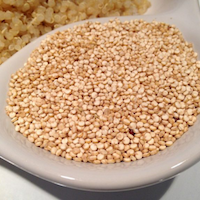Environment and Nutrition
Beginning at conception, environmental factors in health can accumulate over a lifetime and be from sources as broad as geographic location and economic status to specific external sources including physical activity, occupation, risky behaviors and diet. But some of these factors, especially in terms of diet are highly modifiable.
Important research is now being conducted on this concept of the “exposome,” as an environmental complement to the human genome. NRI researchers are learning how diet and other environmental exposures interact with disease and affect responses to treatment.
Publications
Environment and Nutrition Publications
2020
Precision (Personalized) Nutrition: Understanding Metabolic Heterogeneity. Zeisel S
Perspective: Dietary Biomarkers of Intake and Exposure-Exploration with Omics Approaches. Zeisel S
2019
Obesity and Cancer Metabolism: A Perspective on Interacting Tumor-Intrinsic and Extrinsic Factors. Hursting S
When less may be more: calorie restriction and response to cancer therapy. Hursting S
Energy balance and obesity: what are the main drivers? Hursting S
Metabolic Reprogramming by Folate Restriction Leads to a Less Aggressive Cancer Phenotype. Krupenko S
Early-Life Predictors of Fetal Alcohol Spectrum Disorders. May P
Alcohol’s Dysregulation of Maternal-Fetal IL-6 and p-STAT3 Is a Function of Maternal Iron Status. Smith S
2018
Energy balance and gastrointestinal cancer: risk, interventions, outcomes and mechanisms. Hursting S
Research Strategies for Nutritional and Physical Activity Epidemiology and Cancer Prevention. Hursting S
2017
Metabolic Reprogramming by Folate Restriction Leads to a Less Aggressive Cancer Phenotype. Krupenko S
Contribution of Dietary Supplements to Nutritional Adequacy in Various Adult Age Groups. Zeisel S
2016
CerS6 Is a Novel Transcriptional Target of p53 Protein Activated by Non-genotoxic Stress. Krupenko N
Abnormal Eating Behaviors Are Common in Children with Fetal Alcohol Spectrum Disorder. Smith S
Impact of a western diet on the ovarian and serum metabolome. Sumner S
Metabolomics enables precision medicine: “A White Paper, Community Perspective”. Sumner S
Related News
January 2018
Quinoa Compounds Slow Aging, Improve Metabolic Health in Animal Study December 27, 2017 – In a collaboration between Rutgers University and the N.C. State University Plants for Human Health Institute (PHHI) at the NC Research Campus (NCRC), scientists used an animal...
Caramelized Pear, Roasted Tomato and Lentil Salad
December 29, 2017 – This fresh New Year salad combines the natural sweetness of caramelized pear and roasted tomato, with earthy lentils and tender butter lettuce. Finished with lemon zest, olive oil and balsamic vinegar, this elegant salad lends starts the New Year off on a healthy note.
Quinoa Compounds Slow Aging, Improve Metabolic Health in Animal Study
December 27, 2017 – In a collaboration between Rutgers University and the N.C. State University Plants for Human Health Institute (PHHI) at the NC Research Campus (NCRC), scientists used an animal model to show for the first time that quinoa phytochemicals, such as ecdysteroids, may slow the effects of aging and improve metabolic health. Their study was published in the October 2017 edition of the Journal of Functional Foods.
Quinoa Breakfast Bars with Blueberries
December 29, 2017 – A great recipe to get your day started!
December 2017
Choline: The essential but forgotten nutrient November 27, 2017 – Perhaps it’s because you don’t see it on nutrition labels yet, but choline — an essential nutrient from conception through old age — tends to be tragically overlooked. According to data from the...
Choline: The essential but forgotten nutrient
November 27, 2017 – Perhaps it’s because you don’t see it on nutrition labels yet, but choline — an essential nutrient from conception through old age — tends to be tragically overlooked. According to data from the National Health and Nutrition Examination Survey, only 1 in 10 of us get enough choline, and those percentages drop among women during pregnancy — right when they need it most.



